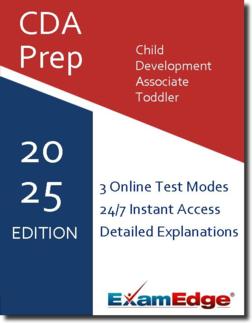Child Development Associate - Toddler (CDA-toddler) Practice Tests & Test Prep by Exam Edge - Topics
Based on 17 Reviews
- Real Exam Simulation: Timed questions and matching content build comfort for your Child Development Associate Toddler test day.
- Instant, 24/7 Access: Web-based Child Development Associate Toddler practice exams with no software needed.
- Clear Explanations: Step-by-step answers and explanations for your CDA exam to strengthen understanding.
- Boosted Confidence: Reduces anxiety and improves test-taking skills to ace your Child Development Associate Toddler (CDA-toddler).

Understanding the exact breakdown of the Child Development Associate Toddler test will help you know what to expect and how to most effectively prepare. The Child Development Associate Toddler has multiple-choice questions The exam will be broken down into the sections below:
| Child Development Associate Toddler Exam Blueprint | ||
|---|---|---|
| Domain Name | ||
| Planning a safe and healthy learning environment | ||
| Advancing Children's physical and intellectual Development | ||
| Supporting Children's social and emotional development | ||
| Building productive relationships with families | ||
| Managing an effective program | ||
| Maintaining a commitment to professionalism | ||
| Observing and recording choldren's behavior | ||
| Understanding principles of child development and learning |


